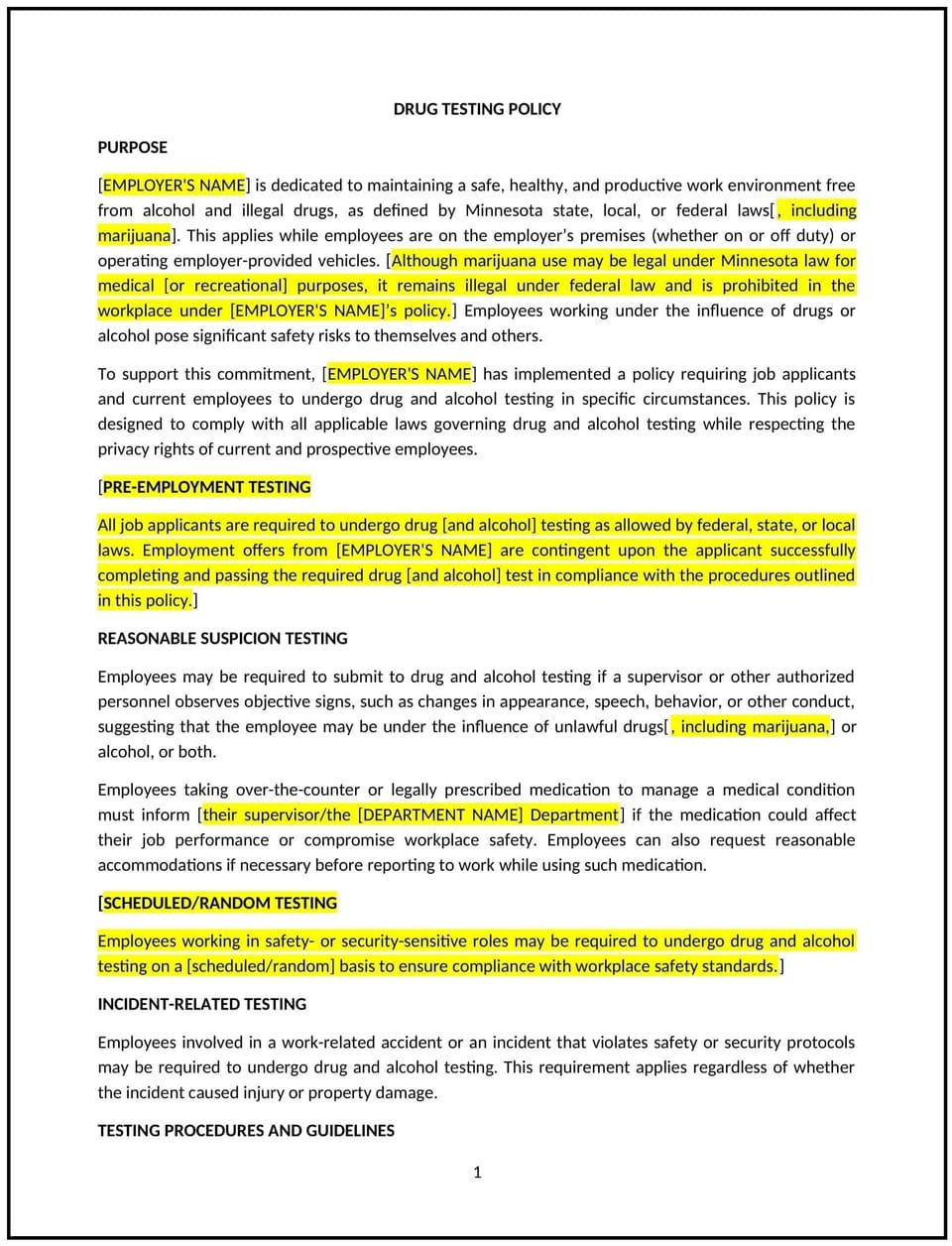Drug testing policy (Minnesota): Free template

Drug testing policy (Minnesota)
This drug testing policy is designed to help Minnesota businesses establish clear and consistent guidelines for drug testing employees. It outlines when and how drug testing may be conducted, the types of testing procedures used, and the legal and ethical considerations for implementing the policy.
By implementing this policy, businesses can maintain a safe and productive work environment, ensure workplace safety, and address potential issues related to drug use among employees.
How to use this drug testing policy (Minnesota)
- Define testing circumstances: Specify when drug testing will be required, such as pre-employment, random testing, after an accident, or when there is reasonable suspicion of drug use.
- Set testing methods: Outline the methods of drug testing to be used (e.g., urine, saliva, blood, or hair testing) and the procedures for how tests will be administered.
- Address privacy and confidentiality: Emphasize the importance of maintaining the privacy of employees' test results and how the company will handle confidential information related to testing.
- Specify consequences for a positive test: Clearly define the actions that will be taken if an employee tests positive for drugs, including potential disciplinary measures or referral to a treatment program.
- Include employee rights: Detail the rights employees have in the drug testing process, such as the right to contest results, the right to seek retesting, and the right to privacy.
- Comply with state laws: Ensure the policy complies with Minnesota-specific laws regarding drug testing, including any specific restrictions on testing for medical marijuana use and the legality of certain substances.
Benefits of using a drug testing policy (Minnesota)
Implementing this policy provides several advantages for Minnesota businesses:
- Promotes workplace safety: Drug testing helps prevent accidents and injuries by ensuring that employees are not impaired while performing job duties.
- Improves productivity: By discouraging drug use, businesses can ensure that employees remain focused and perform at their best.
- Reduces legal and financial risks: Regular drug testing can help reduce the risk of lawsuits, workers' compensation claims, and liabilities related to drug use at work.
- Supports a healthy work environment: The policy fosters a culture of safety and responsibility, where employees are expected to adhere to workplace standards.
- Reflects Minnesota-specific considerations: Adapts the policy to comply with Minnesota’s specific laws on drug testing, including provisions regarding medical marijuana use and employee rights.
Tips for using this drug testing policy (Minnesota)
- Communicate clearly: Ensure that all employees are informed about the drug testing policy, including when testing will occur, what substances are being tested for, and the potential consequences.
- Provide training: Offer training for managers and HR personnel on how to handle drug testing procedures and ensure that testing is conducted consistently and fairly.
- Respect privacy: Safeguard employees' personal and test-related information, and ensure that only authorized personnel have access to test results.
- Regularly review the policy: Periodically review and update the policy to ensure it aligns with Minnesota laws, especially regarding medical marijuana, and any changes in business needs or safety protocols.
- Implement support systems: Consider offering resources for employees who may be struggling with substance abuse, including employee assistance programs (EAPs) or referrals for counseling and treatment.
Q: When will drug testing be required?
A: Businesses should define the specific circumstances under which drug testing will occur, such as pre-employment, random testing, after an accident, or when there is reasonable suspicion of impairment.
Q: What types of drug testing methods can be used?
A: Businesses should specify which testing methods will be used, such as urine, blood, saliva, or hair follicle tests, and outline the procedure for each type of test.
Q: What happens if an employee tests positive for drugs?
A: Businesses should outline the potential consequences of a positive test, including disciplinary action, suspension, mandatory counseling, or referral to an employee assistance program (EAP).
Q: Do employees have any rights during the drug testing process?
A: Yes, employees should be informed of their rights, including the right to contest a positive result, request a retest, and maintain confidentiality of their test results.
Q: How should the company handle medical marijuana use?
A: Businesses should ensure that the policy complies with Minnesota’s laws on medical marijuana, which may provide protections for employees with valid medical marijuana prescriptions, while still maintaining a drug-free workplace for safety.
Q: Can drug testing be done without notice?
A: Businesses should outline when testing can be conducted without prior notice, such as for random testing or when there is reasonable suspicion of drug use.
Q: How often should this policy be reviewed?
A: The policy should be reviewed annually or whenever there are changes in state or federal laws, workplace safety regulations, or company procedures.
This article contains general legal information and does not contain legal advice. Cobrief is not a law firm or a substitute for an attorney or law firm. The law is complex and changes often. For legal advice, please ask a lawyer.


